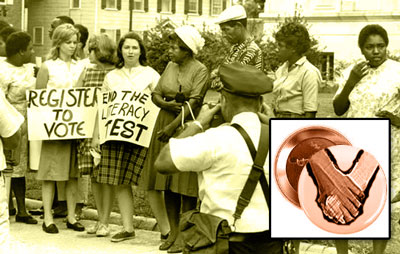Page 1 Page 2 Page 3 Page 4 Page 5

Oh, freedom, oh freedom
Oh freedom over me
And before I’d be a slave
I’d be buried in my grave
And go home to my Lord and be free
The First Amendment to the Constitution guarantees the right of peaceable assembly and the right to petition the government for redress of grievances. This has generally been interpreted as a right to picketing and peaceful protest demonstrations. Today so many demonstrations take place that most of them aren’t even reported in the news. Police seldom interfere and often aren’t even present.
But in Mississippi in the 1960s demonstrators were routinely arrested and fined or jailed. The most common charge was parading without a permit. Real parades usually require the closure of streets, and requiring permits is generally recognized as legitimate. In Mississippi, however, demonstrators were charged with this even when there were no street closures. Other trumped-up charges included loitering, resisting arrest, even inciting to riot.
During the Freedom Summer this was challenged on a massive scale. A day was picked for demonstrations across the state. The demonstrations at the Bolivar County Courthouse, where I was, went smoothly as planned. When I and the other summer volunteers arrived, the jail was packed with local blacks who had started demonstrating earlier. We could hear them singing freedom songs from their cells. Once the jail was filled the sheriff stopped making arrests and we were free to picket as we pleased. I picked out a picket sign from the discarded placards that said “No Taxation Without Representation.” About a hundred people were lined up at the registrar’s office. The NAACP lawyers obtained the release of the prisoners pending trial, then began the long series of appeals to get the charges thrown out as unconstitutional.
Things didn’t go so smoothly in some of the other counties. Several counties lined up buses and took the overflow to Mississippi State Penitentiary in Parchman. This created confusion over who was arrested, and there were problems in arranging transportation when they were released. At least one county hastily set up court and tried and convicted everyone before the lawyers could get there. Once convicted it’s not as easy to get them out of jail. A few volunteers were in state prison for over a year before their convictions were overturned. The Mississippi courts were unsympathetic, and the cases had to be taken to federal court. The federal court decisions did create precedents that made it easier to fight future arrests, but that didn’t console the unlucky volunteers.
At the beginning of the summer we were warned about the possibility of arrests, beatings — and worse. The volunteers were all required to post for bail in case of arrest. I borrowed the money from my grandfather and was able to return it to him at the end of the summer. My guardian angel was working overtime that summer.
We have hung our heads and cried
For those who like the three have died
Died for you and died for me
Died for the cause of equality
But we’ll never turn back, no, we’ll never turn back
Until we’ve all been free
And we have equality
Mississippi was headline news every day for the summer of 1964. The media spotlight was credited for keeping the violence down. At the beginning of the summer some civil rights leaders were openly predicting that the Freedom Summer would be a bloodbath, with the volunteers as sacrificial lambs. But most of the media attention was on church bombings and the search for the three missing civil rights workers. Little was said about voter registration and the plight of the blacks.
The Neshoba County Sheriff’s Department was initially in charge of the investigation into the disappearance. Sheriff Rainey was on national television saying, “Those boys are probably back in New York having a good laugh.”
The FBI declined to enter the case until ordered to do so by Attorney General Robert Kennedy. Even then they spent more time investigating and harassing the civil rights movement than they spent investigating the disappearance. J. Edgar Hoover’s antipathy toward Dr. Martin Luther King, Jr. is well documented, and the majority of FBI agents in Mississippi were Southerners sympathetic with the prevailing racial hatred.


Excellent site. Lots of helpful details in this article. My business is sending it to some friends ans additionally revealing around delectable. Of course, thanks for your sebaceous!